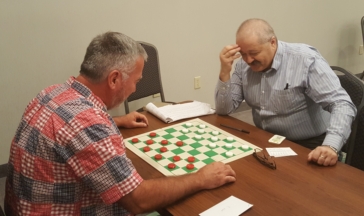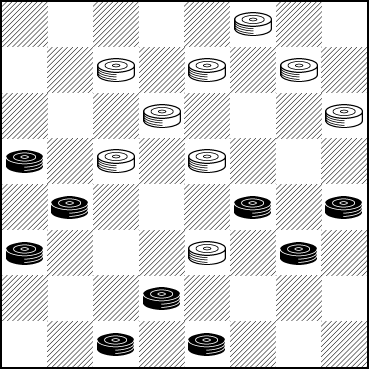Taking On The Champ, Part 2

Last month we presented the first game of Watson's exciting match against Alex Moiseyev, which ended in a draw. This month we'll look at the second game of the round. Will Alex come roaring back?
Watson says: "This game I took the white. I actually like the white side in this opening. We began the game. No unexpected moves. Again, I felt good about the game."
| 1. | 11-15 | 24-19 |
| 2. | 15x24 | 28x19 |
| 3. | 8-11 | 22-18 |
| 4. | 10-14 | 25-22 |
| 5. | 11-16 | 29-25 |
22-17 or 27-24 should be played here instead.
| 6. | 6-10 |
Loses the advantage; 16-20 would have retained it.
| 6. | ... | 27-24 |
Watson thinks this is a key moment: " ... the turning point in this game came at move 12 (27-24). This set up was what my Dad used to play all the time against me. He liked it. I never thought much about it. However, when this move came up, I was thinking my Dad was watching. I could almost hear him saying, 'Move there, Watty.'"
| 7. | 1-6 | 31-27 |
32-28 is considerably better.
| 8. | 16-20 |
7-11 was better. The game is now back in the KingsRow opening book.
| 8. | ... | 32-28 |
| 9. | 4-8 | 19-15 |
Watson now thinks the game is decided: "The next move to change the game in my opinion was 19-15 exchange. To me, this was the winning move. He never recovered."
| 10. | 10x19 | 24x15 |
| 11. | 9-13 | 18x9 |
| 12. | 5x14 | 22-18 |
| 13. | 6-9 | 15-10 |
| 14. | 8-11 |
May lose; 12-16 was correct. But let's let Watson describe what happened:
"The next key move, in my opinion, was 15-10 ... By this time, Alex was in serious trouble ... I did not see a single good move for Alex. I saw my win. I was happy. I think Alex saw no way out.
| 14. | ... | 28-24 |
| 15. | 11-16 |
11-15 was a little better.
| 15. | ... | 24-19 |
"I do not know why, but it seemed like someone was nudging me. The voice was saying 'offer the draw.' I was thinking the game is almost over. I have it ... But I kept thinking I needed to offer (the) draw. I cannot fully explain why I offered the draw except to say at that point, I was very happy to get a draw against the World Champion. I knew three things. It had been a long day and I was tired. I knew that Frank and Mary (the hosts) had been very patiently waiting for us to finish. I knew I had a 700 mile trip ahead of me that day ... So I said to Alex, 'Would you like the draw?' Alex looked up at me, surprised. Alex could see it was over. He smiled and said, 'Yes, I would. Thank you.' We shook hands and that was it. It was a very good feeling for me."

BLACK
Black to Play; What Result?
B:W30,27,26,25,23,21,19,18,10:B20,16,14,13,12,9,7,3,2.
What do you think? Should Watson have taken the draw, or is there a White win? What is Black's best continuation? Is there a way for White to go wrong and allow a Black win?
Take on both Watson and Alex and see what you can come up with, then click on Read More to see what might have happened had the game gone on. And be sure to read Watson's full story here.![]()
Solution
What are Black's options here?
20-24 loses a man, as does 3-8 or 2-6. 14-17 loses two men.
That only leaves 13-17 and 7-11. Let's look at both.
| 16. | 13-17 | 10-6 |
| 17. | 7-10 | 25-22 |
| 18. | 9-13 | 18-9 |
White Wins.
But the computer's choice is actually 7-11.
| 16. | 7-11 | 25-22---A |
| 17. | 3-8 | 30-25 |
White wins as Black has no move that doesn't lose a man.
A---In the first game, one reason Watson took a draw was a fear of blundering into a loss of his own. In that game, such a blunder was unlikely, but in this game, there is a move that leads to trouble, and it looks natural enough:
| 16. | ... | 19-15 |
| 17. | 2-7 | 15-8 |
| 18. | 16-19! | 23-16 |
| 19. | 14-32 | 10-6 |
| 20. | 12-19 |
and White is done for. Master players would likely see this continuation, but in the heat of the moment, anything can happen.
So Watson could have won (again!), but he took a prudent draw instead. Was that the right decision? It's one thing to study a position in the stress-free environment of our living rooms; it's quite another to do so over the board with the clock ticking.
Watson drew twice against a great champion. How many of us could have done as well?
You can email the Webmaster with comments on this article.